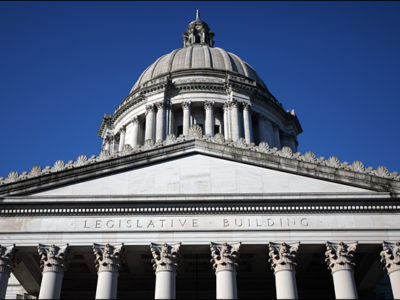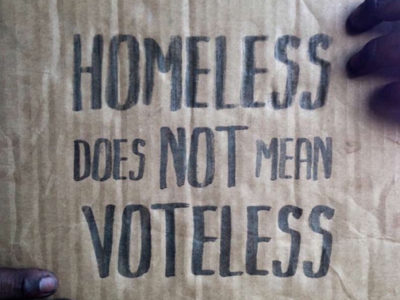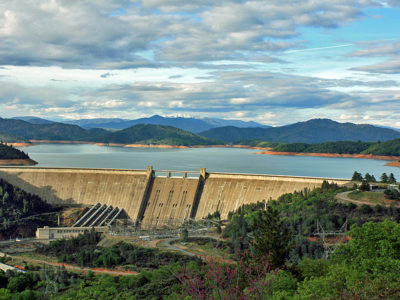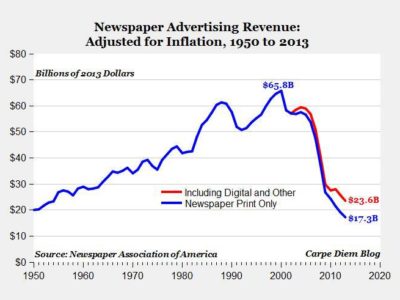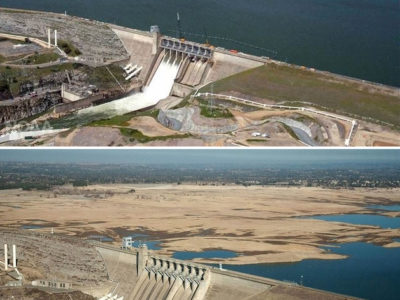Month: April 2019
Trump’s Campaign to Gag Activist Shareholders
His recent executive order tries to “protect” oil companiy management from smart climate planning.
Exxon management was not pleased when shareholders forced them to produce a report on how climate change would impact their business. In May, Exxon is facing another shareholder vote on whether to form a climate change committee on the Board of Directors and whether to disclose how sea level rise will impact its investments on the …
Continue reading “Trump’s Campaign to Gag Activist Shareholders”
CONTINUE READINGJournalism and Political Polarization
Reporters Might Hold A Key To Improving Environmental Politics
It’s no surprise that American politics has gotten significantly more polarized over the last three decades, so it stands to reason that legislatures have gotten more polarized as well. But in a recent article in the Journal of Political Economy by James Snyder and David Stromberg, brought to my attention by Professor Seth Masket writing …
Continue reading “Journalism and Political Polarization”
CONTINUE READINGCan Voter Registration Combat NIMBYism?
Homeless Voting Can Change the Urban Political Calculus
NIMBY land use politics stems from a classic political process failure: the people who would benefit from more housing do not yet live in the jurisdiction where it will be built — and for the most part, do not even know that they will be the ones who will live there. Thus, local officeholders have …
Continue reading “Can Voter Registration Combat NIMBYism?”
CONTINUE READINGHappy Tax Day!
It’s the perfect time to talk about a carbon tax.
Justice Oliver Wendell Holmes once said that taxes are the prices we pay for a civilized society. A carbon tax, if we ever get one, might turn out to be the price we pay for a sustainable planet. I’m not wedded to it as a tool for cutting carbon, and I don’t think it would …
Continue reading “Happy Tax Day!”
CONTINUE READINGCleveland, City of Light, City of Magic
Newspaper Layoffs Claim The Plain Dealer’s Energy Reporting
On Tuesday, I wrote about the demise of local newspapers nationwide and in particular the collapse of the Cleveland Plain Dealer, arguing that universities need to fill the gap of quality journalism. I also suggested that this is an environmental issue, as it is local newspapers’ coverage of the environment that often drives the conversation. …
Continue reading “Cleveland, City of Light, City of Magic”
CONTINUE READINGWhat Else Should Congress Investigate?
Understandably, a lot of attention is focused on the White House. But other issues cry out for investigation.
Every day, it seems that there is a headline about some investigatiion involving tcampaign finance violations, the White House, or the actions of some foreign power. Perhaps that’s all the bandwidth that Congress has. But there are other areas calling out for inquiry. Here are just a few: CAFE Standards. The car industry asked for …
Continue reading “What Else Should Congress Investigate?”
CONTINUE READINGEven Worse Than Duke
San Francisco Takes NIMBYism to a New Level
A few years ago, an episode of South Park saw Cartman attempting to rescue Kyle in San Francisco from a SMUG alert. It was, as it is so often, ahead of its time: The San Francisco Board of Supervisors on Tuesday unanimously rejected a 63-unit apartment complex, including 15 below-market-rate units, because it would cast …
Continue reading “Even Worse Than Duke”
CONTINUE READINGTrump Administration’s Cold Water War With California Turns Hot
Feds’ Curious New Lawsuits Against State Water Board Likely Just the Opening Litigation Salvo
When it comes to California water policy, the federal-state relationship has always been both strained and challenging. That intergovernmental tension harkens back at least to the Reclamation Act of 1902. In section 8 of this iconic federal statute that transformed the American West, Congress declared that the federal government “shall proceed in conformity with” state …
Continue reading “Trump Administration’s Cold Water War With California Turns Hot”
CONTINUE READINGGoodbye, Cleveland!
Newspaper Collapse Threatens The Environment: Universities Need To Fill The Gap
In 1970, Cleveland’s Cuyahoga River famously caught fire. This past week, we have seen an even worse environmental disaster for the city: The Plain Dealer on Monday laid off 14 newsroom employees as part of a staff reduction first announced in December. The 14, most of them reporters and all members of Local 1 of …
Continue reading “Goodbye, Cleveland!”
CONTINUE READINGA Contingency-Based Framework to Support Drought Decision Making
Part 4 in a Series on Improving California Water Rights Administration and Oversight for Future Droughts
In my last post, I outlined actions the State Water Resources Control Board (Board) can take to improve its future drought response capabilities. Our core recommendation is for the Board to bring greater predictability, timeliness, and effectiveness to water rights administration and oversight during droughts by proactively developing a contingency-based framework to support its drought …
Continue reading “A Contingency-Based Framework to Support Drought Decision Making”
CONTINUE READING




